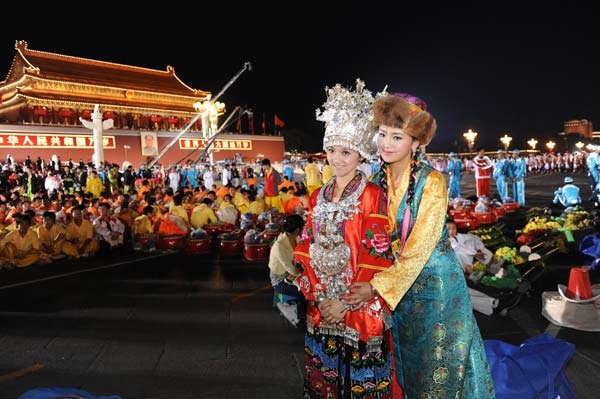Ethnic unity highlighted at China's National Day evening gala
Ethnic unity became a major theme of a grand gala in Beijing Thursday evening marking the 60th anniversary of the founding of the People's Republic of China.
|
|
|
A view of the Tian'anmen Square before a grand gala celebrating the 60th anniversary of the founding of the People's Republic of China, Oct. 1, 2009. (Xinhua/Huang Jingwen) |
Dressed in traditional festive costumes of different ethnic groups, tens of thousands of performers danced joyously to the rhythm of famous folk songs of different ethnic groups on Tian'anmen Square in downtown Beijing.
Apart from the major ethnic group of Han, China has 55 minor ethnic groups, whose people are always characterized by their distinctive costumes, folk customs, songs and dances.
Many of their folk songs eulogize the love between young couples, the love for their homeland and the love for the nation. Some of the songs were performed at the gala to voice Chinese people's cherish for ethnic unity.
Take "The Wonderful Xinjiang" for instance, the song of Uygur ethnic group gives the audience a vivid depiction of the remote Xinjiang Uygur Autonomous Region in northwest China: a vast expanse of pasture and farmland, flocks and herds, succulent grapes, melons, pears and peaches, and rich mineral resources of coal, iron, gold and silver.
In the Tibetan song "The Emancipated Serfs Are Singing," the writer mentions the images of glowing sun, soaring eagle, beautiful spring scenery on the Qinghai-Tibet Plateau, a shining expanse of white snow on mountains and the torrents of the Yarlung Zangbo River to convey the relaxation and happiness of Tibetans who have bidden farewell to the bitter days of being serfs.
In the latter part of the song, the lyrics read, "Chairman Mao is like the red sun, our savior is the Communist Party of China, the emancipated serfs are singing, the happy song spreads far away."
Similar themes singing praise of Chairman Mao Zedong, the Party and the Chinese People's Liberation Army can also be heard through many other folk songs of different ethnic groups.
In the folk song of Gaoshan ethnic group in the island province of Taiwan, "Girls In Mount Ali," young men are described as high mountains while young women are likened to green water, and they will never separate from each other -- just like green water always surrounds high mountains.
 0
0 







